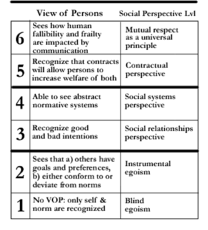No.12053
File: 1683931501468.png (735.77 KB, 755x1024, 755:1024, large.png) ImgOps Google
Nobody owes you anything. You owe others respect for their human rights.
States don't owe you anything. You owe states loyalty and obedience.
Politics is full of contrary ideas and best avoided.
No.12054
File: 1683932064326.png (286.43 KB, 570x660, 19:22, eh heh 4.png) ImgOps Google
if... you owe others respect for their human rights... are you not also "others", from the frame of reference of others?
and so... doesn't that mean everybody owes your respect for your human rights?
...if States are just... organizations of people, for the governance of people, aren't we all part of "States?" If we owe states loyalty and obedience... and we are represented by, or are, the state... does the state not owe us, loyalty and obedience too?
...yes? Kant's Categorical Imperative?
No.12055
>>12054I was actually going to write "I" rather than "you," as in "I owe others respect for their human rights," but I thought it made it sound weird. You are correct, as a general philosophy, it would imply you might be owed respect by others. And then you won't get that respect and you'll get upset, and then life won't be simple anymore.
I don't necessarily have to obey random groups or organizations of people. I have to obey states. Something is different about states that makes them not groups or organizations of people.
No.12057
>>12056>it's simple morality.I think it's important to be empathetic toward those with a difference sense of morality.
>States owe you explicitly by the nature of their claimed authority over you.That claim gives obligation. Especially combined with taxation.
I think the important thing is people can never oppose the state. That's what I meant by loyalty. States will occasionally prefer killing people, so it does not seem states owe people life, and if states do not owe people life, it's hard to make a claim you are owed anything lesser.
States will at times prefer to attack you and your countrymen. I think we can think of it as a bit like a lottery. But you want to stay positive and respectful.
No.12058
File: 1684031652070.png (157.98 KB, 443x501, 443:501, musonius.png) ImgOps Google

Well, being a civilized animal, I suppose I ought to put in my two-cent piece here...
You make an interesting set of points, so I am interested in responding.
I do think people ought to respect others simply for being human. This aligns well with the philosophy of Stoicism, because even if someone does something harmful to you or others, they still could not have acted any other way - not in a deterministic sense, but in the sense that everyone does, in each action, what seems right and good to them.
In regard to states, the civilized ancient Greeks and Romans before Stoicism, such as Socrates, for example, would have agreed with you. But one of the questions the Stoics asked was what if the state orders you to do something harmful either to yourself or to others? Do you then owe them your loyalty and obedience in regard to that order? Musonius Rufus wrote about some instances whereby disobeying your father (the familial version of the state), you're actually obeying him. The reasoning was that fathers want what's best for their children, and if a father is ignorant of what is best, then you should not heed his advice about what to do. He goes on to make the argument that Zeus, the father of all, must be obeyed before any earthly father.
Applying these ideas to whether or not states should have your loyalty and obedience, I think that the answer is "yes" by default. It is the country you were born in, grew up in, learned from, and there is a history behind it, which ought to be recognized and acknowledged to a degree. But when you find yourself in a position where the state says you ought to do one thing, and you can see that, through the study of your self (which Musonius Rufus would have likely said Zeus decrees you to study), it will do you harm, then that is the time to disobey.
As far as politics goes, I think that there are only a handful of people who are suited for a political career. As far as casual discussion among citizens where politics is the central theme, there is little benefit to this so long as the system is the way it is. For now, it is probably best to discuss things only in broad terms.
Life is simple.
No.12059
File: 1684072381949.png (585.56 KB, 804x1024, 201:256, large.png) ImgOps Google

>>12058>what if the state orders you to do something harmful either to yourself or to others?Arguable people/ponies don't need to be ordered to do what they believe is optimally helpful. The state's power is only manifest when the order is for something the person would not have done otherwise, something that the person believes is either less optimal, unhelpful, or harmful. There might be cases where an obvious error is best overlooked in an order, and the state would actually be happier with disobedience of the obvious error.
But states, if we were to judge, have a history of ordering things that could be judged harmful to yourself and others. It is in this, I'd argue, that a person's obedience is really tested.
In the Bible, Abraham was tested by showing his willingness to kill his son out of obedience to God -- to follow an order Abraham would have otherwise believed would cause the murder of a child. If states are not allowed to kill, we could not really support state power. And since we are not to oppose state power, we must obey especially when it seems to cause harm.
No.12060
>>12059It seems like you're making the point that people know what is best for them, but that they might need someone to order them to do it. In this case, I would question as to why the person who already knows what's best for them wants to be ordered to do it, since they already know what they need to do. And how could one person have authority over another? But this being the case, I think it should be a voluntary arrangement, such as if someone wanted to join the military and be told what to do.
When you say the state would be happy about an obvious error being corrected, do you mean from a technical point of view? Are there not other kinds of errors of judgement?
I think that the story of Abraham, spiritually-speaking, is a dramatic example of faith and how you won't always have a good idea of what God's plan is. I do not think it's about obedience as a virtue. Is that what you mean?
Are you saying that the position of the state is the same as God's, and therefore, the state ought to be allowed to kill? Surely birth and death is not the domain of any man. This being the case, and if I accept your premise, I might conclude that we cannot support state power. Yet, the state does exist. So, how are we to relate to it?
No.12061
>>12060>do you mean from a technical point of view? Are there not other kinds of errors of judgement?I'd say mostly technical. If a cop orders you to put your hands up, but you are upside down, you might follow the intent and have a better chance of not getting shot.
>you won't always have a good idea of what God's plan>obedience as a virtueIt can be both, right?
>Are you saying that the position of the state is the same as GodOh, no. If it was against the state for Abraham to almost kill his son, he shouldn't have done it. Obedience to the state is superior to God.
>we cannot support state powerSince that's not tenable, my idea is that states should be considered amoral -- and not be subject to judgement or question. If you judge or question, I don't know how you could find a way to always obey the state.
No.12062
>>12057I'm not really sure what empathy has to do with what I said at all.
>I think the important thing is people can never oppose the state. Perhaps, but that doesn't necessitate an 'owing', any more than you 'owe' a mob protection payments.
They'll resort to harsh treatment if you don't pay up, but that doesn't make it an obligation you have, inherently. Just one that you are forced, or rather coerced, into providing through threat.
No.12064
File: 1684281427673.jpg (6.87 KB, 316x160, 79:40, horseerase.jpg) ImgOps Exif Google

>>12061Do forgive me for seeming to disregard some of your points. If I had the skill and clarity of mind, I might take your points one by one and, using the Socratic Method, see what they mean. I think this is a sound way of figuring things out. And it's something you can teach yourself to do. So, my replies are far from a thorough investigation into your points.
Instead, I have been following mere curiosity, in the style of Pinkius Piecus, which although not my native school of thought, can be useful in moderation.
>Obedience to the state is superior to GodSome points on this:
1. I don't believe in God in the traditional sense.
2. I don't believe obedience is a virtue.
I will argue against this point from a theological perspective:
If I did believe in God in the traditional sense, and I believed obedience was a virtue, I might be able to justify obedience to the state because by being obedient to the state, you are being obedient to God.
But this idea would rely on both the belief in God and in the existence of the state. I can imagine situations in which the state does not exist but God does. But, I would not be able to imagine a situation in which the state exists and God does not. Therefore, obedience to the state cannot be superior to obedience to God because the existence of the state is dependent on the existence of God, whereas the existence of God is not dependent on the existence of the state.
>my idea is that states should be considered amoralThis idea makes me think of the doctrine of Quietism and raises some interesting questions, such as what it means for a thing to be amoral. If a state can be amoral, can other things be amoral? If yes, what things? If no, why not? (What is the basis of a thing being amoral?) What makes some things capable of possessing amorality and not others? And what is morality, anyway?
No.12070
>>12064>obedience to the state cannot be superior to obedience to GodWell, I don't know. Somehow you have to get to the answer of respect for state power above God or you will be a religious extremist, according to the state.
>If a state can be amoral, can other things be amoral? If yes, what things?Oh, sure. Most things are amoral. Rocks, for example. If a rock falls on someone and hurts them, it's not a moral punishment carried out by the rock, it's just random. (Well, you could believe everything happens for a reason, and everything punishes evil or rewards good. Some people do believe this, but I think most people believe at least some things are morally random.)
>And what is morality, anyway?I'd say a connection to right and wrong, as in good and evil.
The reason I don't want to think about states as moral is simple:
We are to tolerate and obey states. I originally wrote respect, but maybe "tolerate" is better. We must not resist. If there are any rules of society, that appears to be the first.
But we know states may prefer to engage in actions such as genocide. We must tolerate this kind of genocide, but we don't want to say it is morally correct. So the way I see it, you really have to consider states amoral. Anyone may be subject to genocide by a state, and it has no meaning in terms of punishing evil or rewarding good. Genocide is not deserved, in short.
So that's my process so far to keep life simple.
No.12072
>>12065It is not appropriate to resist the state. States exist to enforce formal order by any means preferred. Formal order is circularly defined.
But while we might accept formal order, it's not good or bad, it just is.
No.12073
>>12072It's appropriate to resist the state in much the same way it is appropriate to resist anyone.
A violation of your rights gives moral justification for response and resistance.
Order is irrelevant. Order is not inherently just or moral.
No.12075
File: 1684547557894.gif (14.95 KB, 325x360, 65:72, morality.gif) ImgOps Google

>>12073>>12074This reminds me of Kohlberg's stages of moral development. I don't think anyone has an inherent "right" to resist a state, because rights are kind-of (in a way) defined by states... At a higher level, however, there are human rights, which are inherent. The question, I think, in regard to states, is what one ought to do when what the state does is contrary to human rights. But what do you mean by "resist," I wonder? The word, to me, seems to imply an angsty position, which may not be too healthy...
>>12074I kind-of agree that a person shouldn't fight with whatever that person's concept of "the state" is. What does it mean to accept the state, though? Does it mean passive acceptance of whatever the state does? Acting out is probably not a good idea. So, what then, is a good option, I wonder...
One person only has so much influence. And sitting around getting angry at something that is not up to us is probably not such a great use of our time....
No.12076
>>12075>And sitting around getting angry at something that is not up to us is probably not such a great use of our time..I do think how we frame things in our mind is important and something we control. I'm trying not to be an anarchist, so I guess I'm saying -- if we are going to go with state power, we might do it consistently.
We might say resisting the state would be whatever action someone would find unacceptable in those they hate, or the most undesirable. Perhaps as simple as not showing enough deference to the symbols. But...in trying to accept the randomness of the state, perhaps I am asking for a kind of fairness all the same -- that the state's role of using force on people, legitimately and without their consent, be applied equally. Perhaps the state does not owe you the idea that state power might be applied to all classes of people. If everyone could resist the state legitimately, you'd have no state. But some subset of people might be seen as having the privilege of legitimate resistance. The state then owes these people some level of deference.
No.12078
>>12074The purpose of the state is to facilitate justice.
An unjust state has no moral authority, and so is reasonable to resist.
The justness of a state is what determines if it can exist, not whether people have a right to resist.
If people have no cause to resist then they won't resist. A just state shouldn't give them that need.
>>12075>because rights are kind-of (in a way) defined by statesDepends on your view of rights. I certainly wouldn't agree, given my own.
Rights are not absolute laws of the universe. They're, in essence, casus belli.
A justification to resistance.
> But what do you mean by "resist," I wonder? There's a range of potential to such a thing, but I think it's important to remember that ultimately, all authority is derived from violence.
The smallest of fine will ultimately result in lethal force used against you, if you refuse to acquiesce.
No.12092
>>12079The state's claim to legitimacy lies in its just action.
If the state is not just, it has no cause to exist. Thus, no legitimacy.
Unjust law has no moral authority, and moral authority is the only means by which a state survives.
No.12095
>>12094States do not have a monopoly on violence, and never have.
The simple fact is, irrespective of how well armed a state is, the people outnumber their agents.
If you anger enough of the population, a state will simply cease to exist. Thus, maintaining just rule is vital.
No.12098
>>12097>an existing state... ...must be sufficiently just to not deserve such opposition, therefore obey.Yes, precisely.
That is the only means by which states survive.
Fear is insufficient, and so it must have a moral backing, lest it fall apart.
No.12131
>>12130The state may prefer to serve the public, as judged by an individual subject, a group of subjects, or a majority of subjects. Often opinions about what actions the state may do that serve the public good vary, and it's probably unlikely that at least some subjects feel any given state is serving the public good.
Sometimes states request feedback on how they are doing, and proving that feedback is obedient.
But in situations where an individual feels the state or state agents are not acting as public servants, and no legal and respectful option exists for feedback, we have a situation where nothing more can be done. And I say "states owe you nothing" because this situation is possible for any individual.
[Perhaps true, my phrase is an overstatement. "States owe you what states believe they owe you and nothing more." might be better. Or maybe "states owe you what you happen to get" avoids anthropomorphizing states as entities with beliefs.]
